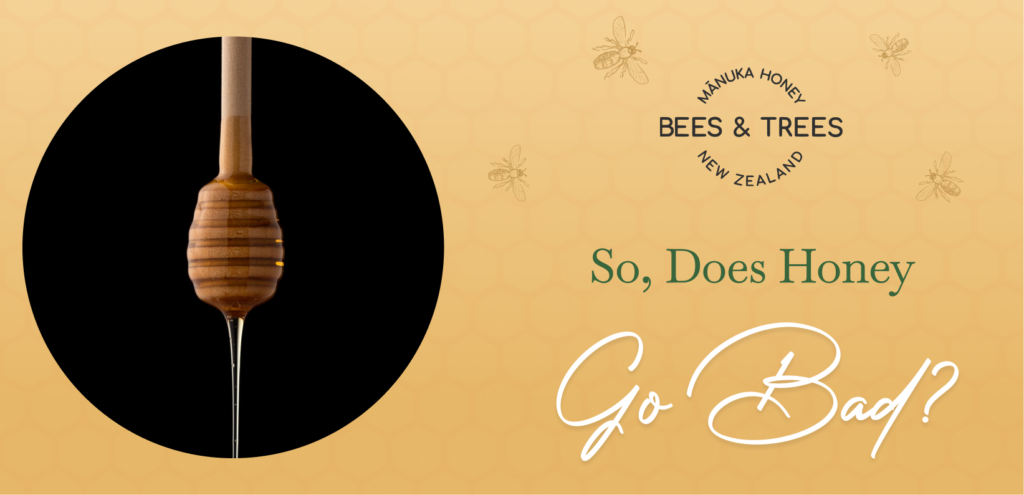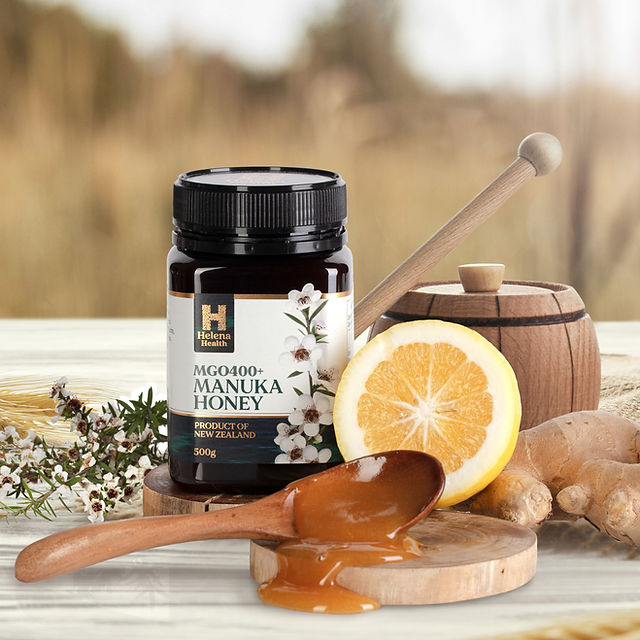
If you’ve got a jar of delicious, golden manuka honey tucked away in your kitchen, you may be wondering: can manuka honey go bad? This sweet and unique honey has gained popularity for its potential health benefits and antibacterial properties. However, like any other food, its shelf life isn’t infinite. In this article, we’ll explore the factors that can affect the lifespan of manuka honey and find out whether it can go bad or not. So, let’s dig into the fascinating world of manuka honey and discover if this golden goodness can stand the test of time.
What is Manuka Honey
Manuka honey is a type of honey that is produced by bees that feed on the nectar of the manuka tree (Leptospermum scoparium) in New Zealand and Australia. It is known for its distinct taste, rich aroma, and unique therapeutic properties. Manuka honey has been used for centuries by indigenous cultures for its healing and medicinal benefits, and it has gained popularity worldwide in recent years.
Definition
Manuka honey is different from regular honey because of its high content of a compound called methylglyoxal (MGO). MGO is responsible for the antibacterial activity of manuka honey and is measured using the Unique Manuka Factor (UMF) grading system. The UMF rating indicates the level of MGO in the honey, with higher ratings indicating a higher concentration of MGO and therefore greater therapeutic benefits.
Origin
Manuka honey comes from the flowers of the manuka tree, which is native to New Zealand and Australia. The bees collect the nectar from the manuka flowers and convert it into honey. The manuka tree is known for its antimicrobial properties, which are transferred to the honey through the nectar. This unique combination of properties sets manuka honey apart from other types of honey.
Unique Properties
One of the most unique properties of manuka honey is its high antibacterial activity. The presence of MGO gives manuka honey strong antimicrobial properties, making it effective in combating bacterial infections. Manuka honey has also been found to have anti-inflammatory, antioxidant, and wound-healing properties. This makes it useful for a wide range of applications, including skincare, digestive health, and immune support.
Factors That Affect the Shelf Life of Manuka Honey
The shelf life of manuka honey can vary due to several factors. It is important to store and handle manuka honey properly to prevent spoilage and maintain its quality.
Purity of the Honey
The purity of manuka honey plays a significant role in its shelf life. Pure, authentic manuka honey is less likely to spoil compared to adulterated or low-quality honey. It is important to purchase manuka honey from reputable suppliers who provide authentic and certified products.
Packaging and Storage Conditions
The packaging and storage conditions of manuka honey can greatly influence its shelf life. It is best to store manuka honey in airtight containers to prevent exposure to air and moisture. The honey should be kept in a cool and dark place, away from direct sunlight and heat sources.
Moisture Content
The moisture content of honey is another factor that affects its shelf life. Honey with higher moisture content is more prone to fermentation and spoilage. Manuka honey generally has a low moisture content, which contributes to its longer shelf life compared to other types of honey.
Exposure to Light and Heat
Manuka honey should be stored away from direct light and heat sources. Exposure to light and heat can cause the honey to degrade and lose its potency. It is best to store manuka honey in a cool, dark place, such as a pantry or cupboard.
Presence of Contaminants
The presence of contaminants in manuka honey can affect its shelf life and quality. It is important to ensure that the honey is free from any foreign particles, such as dust or debris. Contaminants can introduce bacteria or other microorganisms into the honey, leading to spoilage.
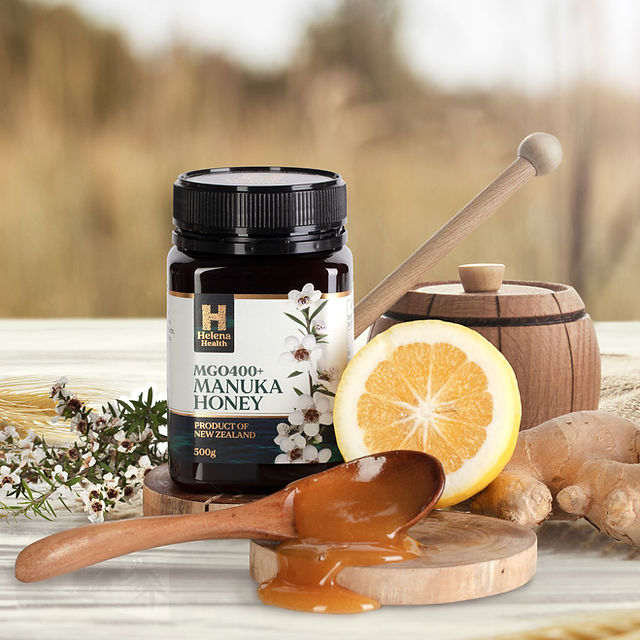
Signs of Spoiled Manuka Honey
While manuka honey has a long shelf life, it can still spoil under certain conditions. It is essential to know the signs of spoiled honey to avoid consuming or using it.
Physical Changes in Color and Texture
Spoiled manuka honey may undergo physical changes in color and texture. The honey may become darker, cloudy, or develop an off-color appearance. It may also become grainy or have a gritty texture. These changes indicate that the honey has undergone fermentation or degradation.
Fermentation and Odor
Fermentation is a common sign of spoiled honey. Fermented manuka honey may emit a sour or alcoholic odor. The taste may also be altered, with a tangy or sour flavor. The presence of fermentation indicates that the honey has been exposed to moisture or contamination.
Presence of Mold
Mold growth is a clear indication of spoiled honey. If you notice any mold or fungal growth on the surface of the honey or inside the container, it should not be consumed. Mold can contaminate the honey and may pose health risks if ingested.
Crystallization
Crystallization is a natural process that occurs in honey over time. However, if manuka honey has excessive crystallization or becomes completely solid, it may indicate that the honey is past its prime. While crystallization does not necessarily mean that the honey is spoiled, it may affect the texture and quality.
Preserving and Extending the Shelf Life of Manuka Honey
To preserve and extend the shelf life of manuka honey, proper handling and storage techniques are crucial. Follow these tips to ensure that your manuka honey stays fresh and maintains its therapeutic properties for longer.
Choosing High-Quality Manuka Honey
Start by purchasing high-quality, authentic manuka honey from reputable suppliers. Look for certified products with a UMF rating to ensure that you are getting genuine manuka honey. Avoid honey that has been heavily processed or contains additives, as these may affect the honey’s quality and shelf life.
Proper Storage and Packaging
Store manuka honey in airtight containers to protect it from air and moisture. Glass jars with tight-fitting lids are ideal for storing honey. Make sure to seal the container properly after each use to prevent the honey from exposure to air and potential contaminants.
Avoiding Contamination
To avoid contamination, use clean and dry utensils when handling manuka honey. Avoid dipping used utensils or wet fingers into the honey, as this can introduce moisture and bacteria. Proper hygiene practices can help maintain the honey’s integrity and prolong its shelf life.
Controlled Moisture Levels
Ensure that manuka honey is stored in a cool and dry environment. Excessive moisture can lead to fermentation and spoilage. Keep the honey away from areas with high humidity, such as the kitchen or bathroom. If the honey becomes exposed to moisture, it is best to discard it to prevent potential bacterial growth.
Temperature Regulation
Manuka honey should be stored at a consistent temperature to maintain its quality. Avoid extreme temperature fluctuations, as this can affect the honey’s texture and flavor. Ideally, store manuka honey at room temperature, around 68-77°F (20-25°C), to preserve its natural properties.
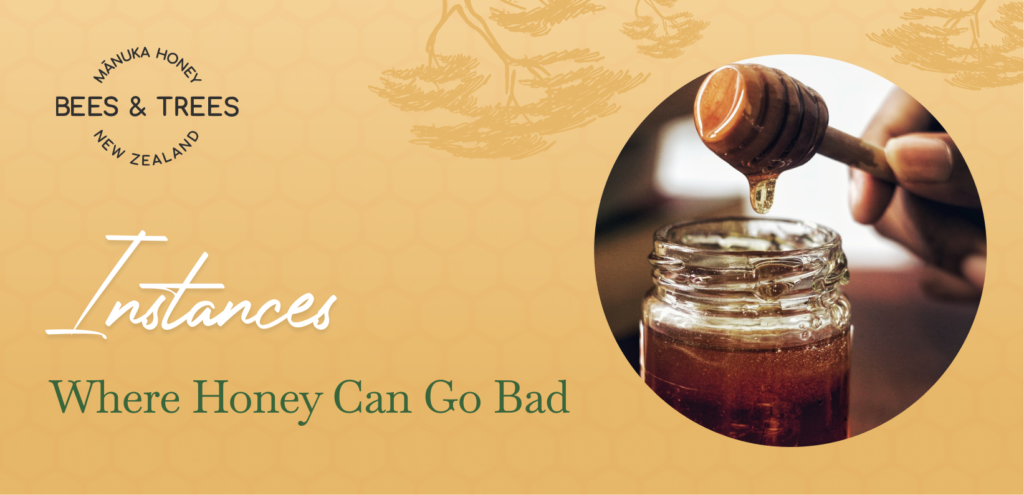
Using Expired or Spoiled Manuka Honey
It is generally recommended not to consume or use expired or spoiled manuka honey. Consuming spoiled honey can lead to foodborne illness or adverse reactions. If you have expired or spoiled manuka honey, it is best to dispose of it and purchase a fresh batch.
Potential Risks
Expired or spoiled manuka honey may contain harmful microorganisms, such as bacteria or mold, which can cause digestive issues or allergic reactions. Ingesting spoiled honey can lead to symptoms like nausea, vomiting, stomach upset, or diarrhea. It is essential to prioritize your health and avoid the consumption of compromised honey.
Methods to Revive Spoiled Honey
In some cases, if the honey has just started to show signs of spoilage and does not exhibit any major signs of fermentation or mold growth, you may be able to salvage it. One method is to gently heat the honey in a water bath to dissolve any crystals or remove moisture. However, it is crucial to use caution and monitor the temperature closely to avoid overheating and further degradation of the honey. It is always best to err on the side of caution and discard honey that shows significant signs of spoilage.
Manuka Honey vs Regular Honey Shelf Life
Manuka honey generally has a longer shelf life compared to regular honey. The unique properties and low moisture content of manuka honey contribute to its extended storage life. While regular honey can last indefinitely under proper storage conditions, manuka honey’s higher antimicrobial activity gives it added protection against spoilage.
Comparison of Shelf Life
Manuka honey can have a shelf life ranging from several years to indefinitely, depending on its quality and storage conditions. Properly stored, high-quality manuka honey can retain its therapeutic properties for years. On the other hand, regular honey can also last indefinitely, but it may crystallize or change in flavor over time.
Factors That Impact Honey Shelf Life
Several factors can affect the shelf life of both manuka honey and regular honey. These include exposure to light, heat, moisture, and contaminants. Proper handling and storage practices, as mentioned earlier, can help ensure that the honey remains fresh and usable for an extended period.
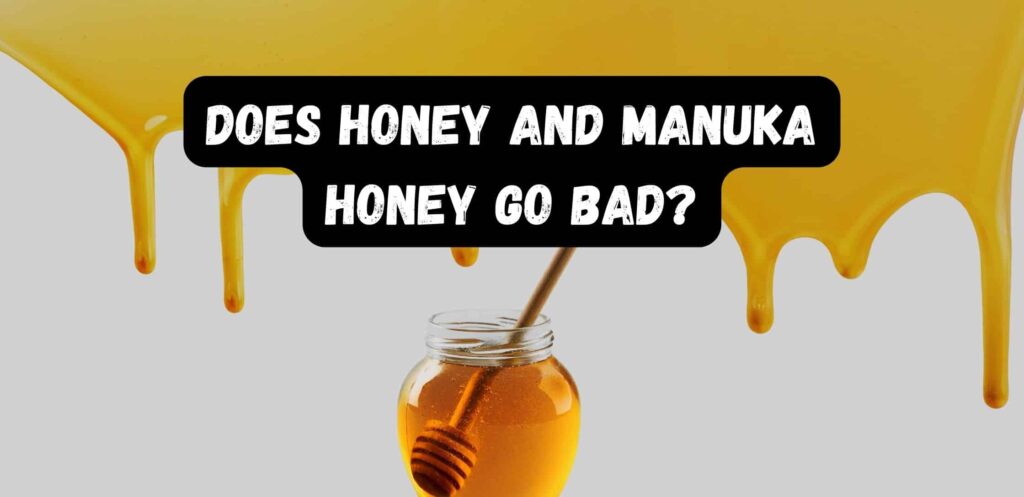
Best Before Date and Expiry Date of Manuka Honey
Manuka honey is typically labeled with a “best before” date rather than an expiry date. The best before date indicates the period during which the honey is expected to retain its quality and taste. It is important to note that the honey may still be safe to consume after the best before date, as long as it shows no signs of spoilage. However, the therapeutic properties and potency of the honey may gradually decline over time.
Understanding Best Before Date
The best before date is a guideline issued by the manufacturer to ensure that consumers know when the honey is at its best quality. It is important to check the best before date when purchasing manuka honey and make sure to use it before that date for optimal flavor and efficacy.
Importance of Expiry Date
While manuka honey does not typically have an expiry date, it is crucial to pay attention to the signs of spoilage to determine if the honey is still safe to consume. Expiry dates are more commonly found on products with a shorter shelf life or those that are more likely to spoil easily. In the case of manuka honey, the absence of an expiry date emphasizes the importance of proper storage and monitoring for signs of spoilage.
Storing Manuka Honey Properly
Proper storage is essential to maintain the quality and integrity of manuka honey. Follow these guidelines to store your manuka honey correctly and ensure its long shelf life.
Ideal Storage Conditions
Store manuka honey in a cool, dry place away from direct sunlight and heat sources. A pantry or cupboard that maintains a consistent temperature is ideal for preserving the honey’s properties. Avoid storing the honey in the refrigerator, as it can accelerate the crystallization process.
Choosing the Right Container
It is best to store manuka honey in glass jars with tight-fitting lids. Glass containers are non-reactive and do not absorb or release any odors or flavors that could affect the honey. Additionally, glass jars provide an airtight seal, protecting the honey from air and moisture exposure.
Avoiding Temperature Extremes
Manuka honey should be kept away from extreme temperatures. Avoid storing the honey in areas that are susceptible to temperature fluctuations, such as near stoves, ovens, or windows. Exposure to high heat or freezing temperatures can impact the honey’s quality and potentially accelerate spoilage.
Maintaining Hygiene
Maintaining hygiene is essential when handling manuka honey. Always use clean and dry utensils when scooping honey from the jar. Avoid introducing moisture or contaminants into the honey, as this can increase the risk of spoilage. Proper hygiene practices can help maintain the honey’s purity and extend its shelf life.
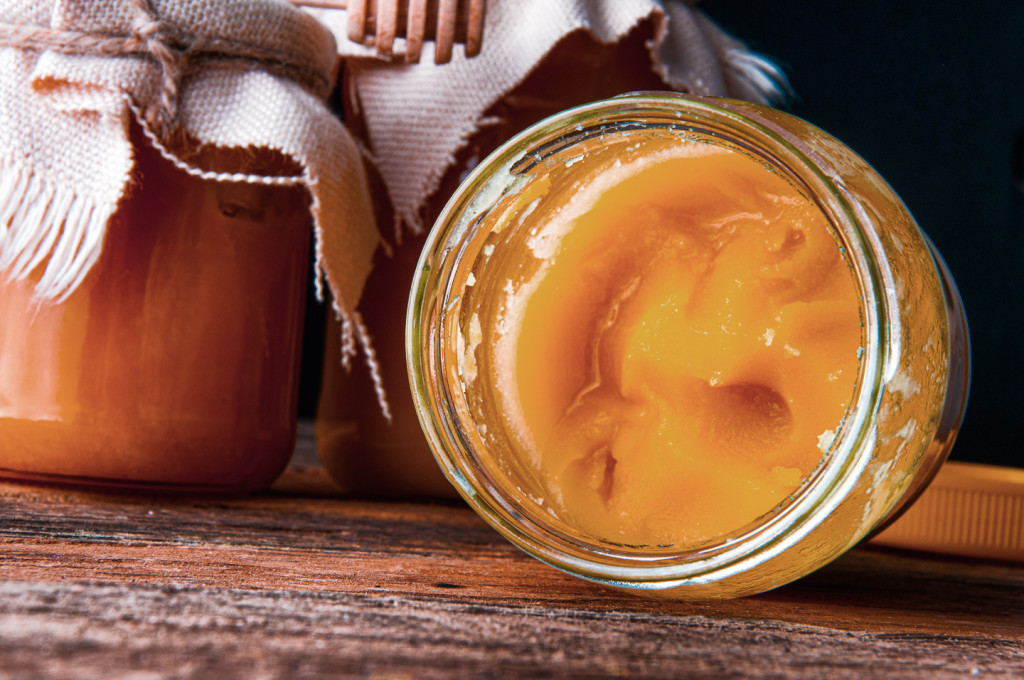
Using Manuka Honey in Home Remedies and DIY Recipes
Manuka honey is a popular ingredient in various home remedies and DIY recipes due to its numerous health benefits. When using manuka honey in these applications, it is important to consider the following factors.
Quality Matters
Using high-quality manuka honey is essential to achieve the desired results in home remedies and DIY recipes. Look for authentic manuka honey with a UMF rating to ensure its potency and therapeutic properties. Using low-quality or adulterated honey may not provide the same benefits and could potentially compromise the effectiveness of the remedy.
Safety Precautions
Before using manuka honey in any home remedy or DIY recipe, it is important to consider any allergies or sensitivities you may have. Always perform a patch test before applying or ingesting manuka honey to ensure that no adverse reactions occur. Additionally, consult with a healthcare professional if you have any underlying medical conditions or are taking medications, as they may interact with the honey.
Checking for Spoilage
Before using manuka honey in any recipe or remedy, it is crucial to check for signs of spoilage. Ensure that the honey appears fresh, with no physical changes in color, texture, or odor. If the honey shows any signs of fermentation, mold, or spoilage, it is best to discard it and use a fresh batch.
Conclusion
Manuka honey is a remarkable natural product with incredible health benefits and a long shelf life when stored properly. By understanding the factors that affect the shelf life of manuka honey and following the recommended storage guidelines, you can ensure that your honey stays fresh, potent, and safe to use. Whether you are using manuka honey for its therapeutic properties, in home remedies, or DIY recipes, choosing high-quality honey and practicing proper storage and handling techniques will help you make the most of this exceptional natural sweetener. So, enjoy the goodness of manuka honey and reap its numerous benefits while savoring its unique flavor and aroma.
